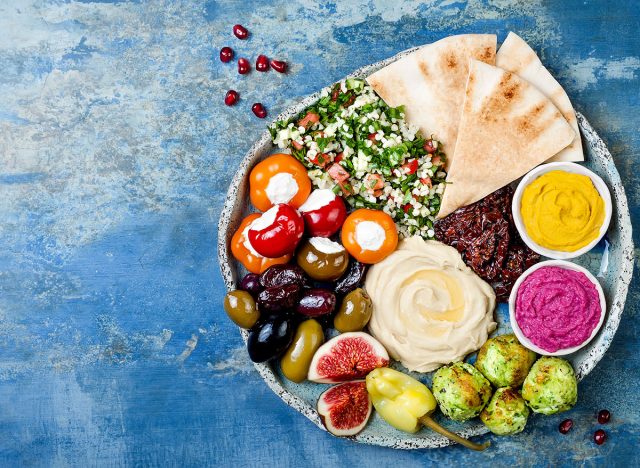Conversations about "staying young" and "slowing the aging process" are everywhere, and all this talk can become overwhelming—especially when you're trying to decipher what is true and what isn't.
Most of us have probably heard by now that what you eat can impact the way you age. But what exactly does this mean for us, and how can we build eating habits that can help us age in a healthy way?
To get a clearer idea, here's what the science says about eating habits and how they can slow the aging process.
The Mediterranean diet really does work.

Chances are you've at least heard of the Mediterranean diet, especially in conversations about aging in a healthy way. This diet gets its inspiration from Italy and Greece and incorporates fruits, vegetables, whole grains, legumes, and healthy fats like olives and olive oil. Fish is incorporated on occasion, but it's mostly plant-based. This diet also significantly limits the consumption of processed foods and added sugars.
The Mediterranean Diet has been praised for its impact on slowing cognitive decline, but what does the research actually say? In 2015, Advances in Nutrition Journal published a systemic review of the relationship between diet, dementia, and brain aging.
According to this review, sticking to a Mediterranean diet as you age has been associated with fewer incidents of dementia and Alzheimer's, as well as slower cognitive aging. This was based on multiple types of studies (cross-sectional and longitudinal), trials, and meta-analyses.
This review attributes certain characteristics of the Mediterranean diet, like antioxidants and mono-unsaturated fatty acids, to its impact on brain aging. The patterns of this diet are said to help lower inflammation and oxidative stress, which are major contributing factors in dementia and cognitive decline.
Eat a diet that can reduce inflammation.

When it comes to aging, science shows that inflammation may be a major culprit in speeding up the process. According to a meta-analysis from Ageing Research Reviews, chronic low-grade inflammation may be a factor in many of the chronic illnesses and diseases that commonly occur with old age.
This review also found that eating or supplementing with omega-3s can significantly help in reducing inflammation as you age. Another study, published in The British Journal of Nutrition, shows that along with omega-3s, things like whole grains and fiber, and a variety of fruits and vegetables are also helpful in reducing inflammation as you age.
Focus on a well-balanced diet, rather than specific nutrients.

It's always possible that your doctor will recommend supplementing certain nutrients as you age, especially if there are specific areas of health that need attention. However, a lot of the research around diet and aging shows that a balanced diet that incorporates multiple nutrients is more effective than supplementation.
According to a recent article published in the International Journal of Molecular Sciences, consuming all the important macro and micronutrients through a wide range of foods like whole grains, lentils, nuts, vegetables, fruits, etc., can have a significant impact on pursuing a healthy life as you age. With this in mind, they also note that a balanced diet that supports healthy aging also focuses on limiting your consumption of added sugars and heavily processed foods.
So while supplementing may be a good idea if recommended by your doctor, focusing on a whole-food, balanced diet full of helpful macro and micronutrients is key in slowing the aging process.
Your diet may be more important than your skincare.

Your skin and how quickly it ages are affected by both internal and external factors, but many people are so focused on solving the external factors (buying the right skincare) that they may not realize just how much their complexion is affected by the internal factors as well (their diet).
According to a report published in Nutrients, there are many different nutrients, vitamins, and minerals that play unique roles in slowing the process of aging skin. For example, protein helps repair skin tissue, vitamin B helps reduce inflammation and pigmentation, vitamin C helps with the synthesis of collagen, and water is crucial in skin hydration and reducing inflammation and signs of aging.
This report also notes that things like smoking, alcohol, a high-fat diet, and added sugars are associated with faster skin aging and damage. But, while your diet does play a key role in your skin aging process, we still recommend wearing that SPF!
If you have questions regarding your diet and healthy aging, talk to your doctor or dietitian about a helpful plan.
No comments:
Post a Comment